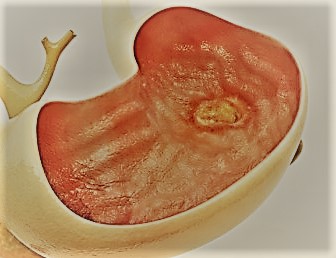
Peptic Ulcer – Any stomach ulcer that is exposed to pepsin is referred to as peptic ulcers. Peptic ulcers are found in the lining of your stomach or duodenum. Pepsin is normally present along with hydrochloric acid in the stomach lining. There are many symptoms of peptic ulcers that are worth checking out.
Gastric Ulcer – When a peptic ulcer is in the stomach, it is called a gastric ulcer. The symptoms of gastric ulcers are more specific than peptic ulcer symptoms.
Duodenal Ulcer – When a peptic ulcer is in the duodenum, it is called a duodenal ulcer. This type of peptic ulcer develops in the first part of the small intestine. Some of the symptoms of a duodenal ulcer are interestingly quite opposite to those of gastric ulcers. Duodenal ulcers are the most common ulcers found in the Western world.
Esophageal Ulcer – This type of ulcer occurs in the lower end of your esophagus. Esophageal ulcers are often associated with a bad case of acid reflux, or GERD as it is commonly called (short for Gastro Esophageal Reflux Disease).
Bleeding Ulcer – Internal bleeding is caused by a peptic ulcer which has been left untreated. When this happens, it is now referred to as a bleeding ulcer – this is the most dangerous type of ulcer. Medical attention should follow as soon as possible.
Refractory Ulcer – Refractory ulcers are simply peptic ulcers that have not healed after at least 3 months of treatment.
Stress Ulcer – Stress ulcers are a group of lesions (or lacerations) found in the esophagus, stomach or duodenum. These are normally only found in critically ill or severely stressed patients.
The term ‘stomach ulcer’ is a pretty broad term that includes quite a few different types of ulcers. It gets a little confusing when you really start looking deeper into figuring out the 7 different types of ulcers found in the digestive system.
Mostly, ulcers are named after the location where they are found but, as with most things in life, there is an exception – the peptic ulcer. For instance, a peptic ulcer can be found anywhere in your esophagus, stomach or duodenum. So, therefore a peptic ulcer can also be an esophageal, or gastric, or duodenal ulcer confused?
BASIC FACTS ABOUT STOMACH ULCERS
- Up to 90 % of all stomach ulcers are caused by H. Pylori and not stress or spicy foods.
- H. Pylori can easily be transmitted by kissing, sexual contact etc.
- In poorer countries 50 % of the population is infected in childhood and 90% by adulthood.
- The W.H.O. reported that H. Pylori is present in 50% of gastric cancer cases.
- Approximately 1 in 8 people will develop duodenal or stomach ulcers in their lifetime.
- Stomach ulcers affect more than 5 million people annually in the U.S.A. alone.
- Each year approximately 300 000 people have ulcer related surgery.
- Each year approximately 6 000 people die of ulcer related complications in the U.S.A.
- Another major cause of ulcers is the prolonged use of NSAID’s. (Nonsteroidal Anti-Inflammatory Agents/Analgesics)
- Both men and women are equally prone to ulcers.
- A person of any age can suffer from ulcers.
- Peptic ulcers affect nearly 1 in 10 of all adults.
- Gastric ulcers may lead to stomach cancer.
- As one ages one usually becomes more prone to H. Pylori infection.
FACTS OF STOMACH ULCER TREATMENTS THAT DOCTORS MAY NOT INFORM YOU ABOUT
Recent studies show that apart from Peptic Ulcers, other diseases such as Crohn’s Disease, Ulcerative Colitis, Rheumatoid Arthritis, and even 50% of New Gastric Cancer cases are linked to the presence of H. Pylori bacterium.
Most doctors do not have an option but to supply and treat ulcers with antibiotics. The prescription is generally for either a Triple or a Quadruple treatment, often in conjunction with Proton Pump Inhibitors (PPI’s) such as Nexium or Prilosec. H.Pylori is becoming increasingly resistant to antibiotic treatment.
The latest antibiotics are now so powerful – in an attempt to be more effective- and thus causing serious side effects, resulting in many patients abandoning the treatment.Approximately 65 % of people affected with H.Pylori are simultaneously infected by Candida Albicans.
HOW TO OVERCOME STOMACH ULCERS BY REMOVING THE CAUSE
If you have been diagnosed with a stomach ulcer, you should request your doctor to arrange a proper test, preferably the Helicobacter Pylori Stool Antigen test (HPSA). If the results are positive – that you are infected – then you have two choices:
You can be treated with Triple Therapy antibiotics with all the known side effects OR
Go for a natural treatment with almost no side effects.
If you choose a natural treatment make sure it complies with the following points:
- Has it been scientifically tested for efficacy and safety?
- Is it non-toxic?
- Does treatment cause any side effects?
- Is it easy and pleasant to take?
- Is the treatment reasonably priced?
- Will you receive unlimited support from a qualified health team, while under and after treatment?
- If the treatment fails, (all traces of H. Pylori have not been eliminated) can you reclaim your purchase price?
MATULA TEA TESTIMONIES FROM ULCER SUFFERERS…
During 2003, my ulcer just got worse and worse. I was diagnosed with Peptic Ulcer and started a treatment, which was a ten day course of antibiotics. It didn’t help so I started on another course of two different antibiotics. My condition improved, but only for a short while, then the pain was back with a vengeance. In the meantime I heard about a herbal treatment produced by you in South Africa. I was told that it was not yet on the market, but I was welcome to try it out. On receipt of the course, I commenced taking it twice a day and already after 8-10 days, did I feel a lot better and on completion of the 30 days course, the pain and discomfort had gone and has never returned. Thank you very much.*
MR E.L, STRUER, DENMARK
All my adult life, I have suffered from heartburn and stomach pain. A couple of years ago, my doctor checked me and diagnosed it Peptic Ulcer. He prescribed a one week course of antibiotics. It didn’t help, so he prescribed another one. This relieved the pain for a week or so, but then it was back in full force. During this period, I was told about your Traditional Tea and a friend, through relatives in South Africa, managed to obtain a 30 days treatment course from you. I started this course and within 2 weeks I felt so much better and at the end of the course, I felt completely cured. * This is now over 3 years ago and neither the ulcer nor the pain has ever recurred. I am still following the recommended diet low on fat, sugar and acid and have greatly reduced my intake of alcohol. I am very grateful for your help.*
MR C.G, BANBURY, LONDON, UK
My sister and I suffered from peptic ulcers for a few years and for both of us it just got worse. She was then completely cured by taking your herbal tea from Africa, which you gave her. * Later you kindly supplied me with a treatment course of the tea and within a month from starting the course, the ulcer was gone and, now after a few years, I have never had it again. Thank you once again.*
MR T.A, VARBERG, SWEDEN
Great information – thank you! I can’t thank you enough for all the information you have sent my way. It’s better than any office visit I ever had with a doctor. Your reports are easy to read and are extremely informative and helpful. The best part is, that I can go back and read them again and again. I chose your program, because I believe in natural healing, rather than using medication, which I feel does nothing but mask the problem. Along with healing gastric erosion/ulcers, I am also treating candida overgrowth, which I need to heal as well, since most of my trouble started after being on antibiotics earlier this year. Thank You!*
MRS M. ROSE, UNITED STATES
By Matula Tea| July 29th, 2018
